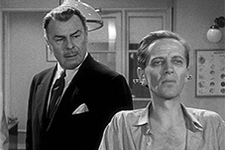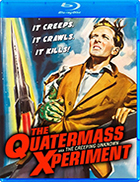The Quatermass Xperiment
|  While British writer/director Val Guest worked in virtually every genre known to humankind over his 40-year career in film and television, he will likely always be best remembered for the science fiction films he made for Hammer Studios: The Quatermass Xperiment (1955, aka The Creeping Unknown), Quatermass II (1957), and The Day the Earth Caught Fire (1961). When he accepted the assignment to direct Quatermass, Hammer was a studio of greatly varied output, producing comedies, mysteries, and dramas. In fact, Guest’s first film with Hammer was the comedy Life With Lyons (1954), which was based on a BBC radio series and produced a sequel, The Lyons in Paris (1955), which Guest also directed. But, with The Quatermass Xperiment’s immense international success, the transformation of Hammer into a prolific producer of science fiction, horror, and fantasy had begun. Ironically, Guest was not particularly interested in science fiction, and he hadn’t watched the live, six-part 1953 BBC television serial on which the film was based. Science fiction as a genre was a relatively new phenomenon on the screen, despite its history in literature and comic strips. However, the development of nuclear weapons at the end of World War II and the increasing tensions of the space race in the 1950s, which found the United States and the Soviet Union competing to launch satellites, animals, and eventually human beings past Earth’s atmosphere created both a new frontier of technology and adventure and a new source of unease and paranoia. While science fiction films of the early 1950s like Destination Moon (1950), Rocket Ship XM (1950), and Flight to Mars (1951) were optimistic and adventurous in spirit, the tone soon turned darker and more horrific with films like The Thing From Another World (1951), War of the Worlds (1953), and First Man Into Space (1959). The Quatermass Xperiment was a crucial turning point in that narrative, as it galvanized a shift in the science fiction genre and opened the door to a flood of similar films. As Bruce Eder argued in his illustrated video his essay included on the Criterion Collection’s DVD release of Fiend Without a Face (1958), a particularly memorable British sci-fi/horror amalgam, Quatermass established an enduring formula that fed British science fiction producers well into the 1960s: Start with a story with some intriguing science (or pseudo-science), cast actors with cool British reserve, cast one recognizable (but usually second-string) American star, and promise some grisly visuals and a truly novel threat. Guest and co-screenwriter Richard Landau maintain the basic plot set-up from Nigel Kneale’s script for the television serial: A manned rocket is launched into space by a joint British-American research group headed by the titular Professor Bernard Quatermass (Brian Donlevy). Contact is lost, and when the rocket crashes back to earth in a rural field, two of the men have disappeared and the third, Victor Carroon (Richard Wordsworth), is in a state of near catatonia. Scotland Yard Inspector Lomax (Jack Warner) is brought in to investigate the disappearance of the other two astronauts, but it soon becomes apparent that they experienced some kind of horrific alien encounter and that whatever it was is now inside of Carroon and slowly transforming him. The make-up special effects created by Phil Leakey, who was already a veteran make-up artist who would go on to design the look of Hammer’s influential Curse of Frankenstein (1957) and Dracula (1958), were so effective that the British Board of Film Classification (BBFC) gave the film an age-restrictive X-rating (which had been introduced in 1951), thus leading to the canny marketing scheme of re-spelling the title to The Quatermass Xperiment (it has since been re-rated PG, but the title still stands). Thus, we can see the formula at work: the scientific hook of manned space exploration and an encounter with a hostile alien entity, the casting of cool British actors (Jack Warner in particular), the casting of a second-tier American star (Brian Donlevy), and plenty of grisly visuals once Carroon starts transforming, which begins with his left hand mutating into a distended, vegetable-like mass. Donlevy had acted on Broadway, had been nominated for an Oscar for Beau Geste (1939), and had starred in two of Preston Sturges’s 1940s comic masterpieces, but his career had been in decline for a number of years (while his alcohol consumption had gone up). Nigel Kneale was particularly critical of his performance, stating that he “was then really on the skids and didn’t care what he was doing … it was a case of take the money and run. Or in the case of Mr. Donlevy, waddle.” Kneale’s real issue was that his protagonist was Americanized, played in a gruff, blustery, noir manner that was quite different from the thoughtful intellectual he had written for the television serial. However Donlevy may lack in the title role is more than made up for by Richard Wordsworth’s haunting performance as Victor Carroon, who is essentially mute for the whole film, but conveys a world of trauma and transformation and horror with his gaunt face, swollen eyes, and rigid movements. Of course, not everything about The Quatermass Xperiment is formula—otherwise we probably wouldn’t still be talking about it. One thing that sets it apart from so many of its imitators was the immediacy that Guest brought to the fantastical story. Rather than shooting it in a slick, polished manner, he and cinematographer Walter Harvey, who was already a two-decade veteran of low-budget films, including several of Guest’s, shot much of it like a handheld documentary, the rough black-and-white images giving a sense of realism to images of crashed rockets and mutating astronauts. Thus, when the gruesome images start taking over in the film’s second half, they have a gravity and verisimilitude that they otherwise might lack.
Copyright © 2024 James Kendrick Thoughts? E-mail James Kendrick All images copyright © Kino Lorber | |||||||||||||||||||||||||||||
Overall Rating: 

 (3)
(3)


